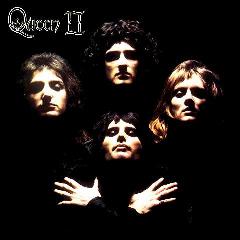Queen – Queen II (1974/1994)
Queen – Queen II (1974/1994)

01 Procession (1:12) 02 Father to Son (6:12) 03 White Queen (As It Began) (4:33) 04 Some Day One Day (4:21) 05 Loser in the End (4:01) 06 Ogre Battle (4:08] 07 Fairy Feller's Master-Stroke (2:39) 08 Nevermore (1:17) 09 March of the Black Queen (6:03) 10 Funny How Love Is (3:14) 11 Seven Seas of Rhye (2:48] 12 See What a Fool I've Been (previously released as b-side) (4:32) 13 Ogre Battle (1991 Remix) (3:30) 14 Seven Seas of Rhye (1991 Remix) (6:36) Bass Guitar, Acoustic Guitar – John Deacon Guitar, Vocals, Bells – Brian May Percussion, Vocals – Roger Meddows-Taylor Vocals, Piano, Harpsichord – Freddie Mercury
In one regard, Queen II does indeed provide more of the same thing as on the band's debut. Certainly, of all the other albums in Queen's catalog it bears the closest resemblance to its immediate predecessor, particularly in its lean, hard attack and in how it has only one song that is well-known to listeners outside of their hardcore cult: in this case, it's "Seven Seas of Rhye," which is itself more elliptical than "Keep Yourself Alive," the big song from the debut. But these similarities are superficial and Queen II is a very different beast than its predecessor, an album that is richer, darker, and weirder, an album that finds Queen growing as a band by leaps and bounds. There is still a surplus of ideas, but their energies are better focused this time around, channeled into a over-inflated, pompous rock that could be called prog if it wasn't so heavy. Even with all the queens and ogres that populate Queen II, this never feels as fantastical as Genesis or Uriah Heep, and that's because Queen hits hard as a rock band here, where even the blasts of vocal harmonies feel like power chords, no matter how florid they are. Besides, these grandiose harmonies, along with the handful of wistful ballads here, are overshadowed by the onslaught of guitars and pummeling rhythms that give Queen II majesty and menace. Queen is coiled, tense, and vicious here, delivering on their inherent sense of drama, and that gives Queen II real power as music, as well as a true cohesion. The one thing that is missing is any semblance of a pop sensibility, even when they flirt with a mock Phil Spector production on "Funny How Love Is." This hits like heavy metal but has an art-rock sensibility through and through, which also means that it has no true hook in for those who don't want to succumb to Queen's world. But that kind of insular drama is quite alluring in its own right, which is why Queen II is one of the favorites of their hardcore fans. At the very least, it illustrates that Queen is starting to pull all their ambitions and influences into a signature sound, and it's quite powerful in that regard. ---Stephen Thomas Erlewine, AllMusic Review
Bardzo szybko, bo już drugim albumem panowie Mercury, May, Deacon i Taylor otarli się o wielkość. To piękna, wspaniale pomyślana płyta, stanowiąca niesamowitą muzyczną opowieść. Pięknie rozpoczętą biciem serca i gitarowo-orkiestrowym wprowadzeniem Briana Maya (Procession), płynnie przechodzącą – jak to kiedyś napisał w „Tylko Rocku” Tomek Beksiński – w rockowy epos (Father To Son), by dalej zadziwić jedną z najpiękniejszych queenowych ballad, White Queen (As It Began). Inna sprawa, że takich pereł, przynajmniej w latach siedemdziesiątych, Królowa miała przynajmniej po jednej na każdej ze swoich płyt. Kolejna liryczna pieśń (Some Day One Day) i taylorowsko-zeppelinowe The Loser In The End cudnie wieńczą pierwszą stronę albumu. A to właściwie było jedynie preludium do kolejnych dwudziestu minut longplaya.
Pozostałe sześć kompozycji to dzieło Mercury’ego. Połączone ze sobą tworzą jedyną w swoim rodzaju suitę. Ogre Battle (z zachwycającymi, niby-operowymi harmoniami wokalnymi i bulgoczącą gitarą), The Fairy Feller’s Master-Stroke (wodewilowo-kabaretowy, o społeczno-politycznej wymowie), Nevermore (balladowy, o fortepianowej melodii), The March Of The Black Queen (pełnen przepychu i zmian nastroju) i wreszcie Funny How Love Is (natchnione zwieńczenie, kojarzące się odrobinę z All The Young Dudes z repertuaru Mott The People). Całość, tak jak i pierwszą płytę, znów kończy Seven Seas Of Rhye. Już z dodanym tekstem, wydłużone o minutę i z „knajpianą” przyśpiewką w ostatnich sekundach z lekka rozczarowuje. Ot, taka odrobina dziegciu na koniec. ---Grzesiek Kszczotek, terazmuzyka.pl
download (mp3 @320 kbs):
Zmieniony (Wtorek, 20 Listopad 2018 13:59)








